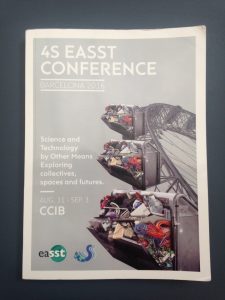Conference Perk > Ping Pong Table
One of the best things about working for dxw is that the perks of the job are actually really useful. No ping pong tables at dxw!
One perk in particular that makes dxw such a great place to work is the conference perk. It does what it says on the tin (or the website, as the case may be): Go to one conference of your choice per year, within reach of a budget flight. And that conference doesn’t even to be related to your role (although most of us do choose conferences related to our roles because we love what we do that much). As a part time user researcher and a full time PhD student, this perk is definitely more useful to me than the Cycle to Work scheme.

I chose to use mine to go to the 4S/EASST conference in Barcelona in September. Aside from being a collection of letters and a number, 4S/EASST is one of the big events of the Science and Technology Studies world – it’s a once-every-four-years conference that combines the European Association for the Study of Science and Technology (EASST) with its American counterpart, the Society for the Social Studies of Science (4S).
A brief note for those wondering what Science and Technology Studies (STS) is in 25 words or less: it’s a part of the social sciences that looks at how scientific knowledge and technology is negotiated and made (amongst many, many other ideas), and the societal impacts of science and technology.
The 4S/EASST conference is massive – there were around 2000 academics discussing ideas and presenting research about science and technology from a social sciences perspective. There were so many tracks on a wide range of topics but I chose to attend those related to infrastructure. This decision was twofold: 1) my PhD looks at infrastructure and how people discuss it on social media and, 2) the public sector works with and creates infrastructure all the time with varying degrees of success and controversy.
Suffice it to say, the presentations were relevant from both perspectives. I heard about the energy impacts of domestic IT use, how infrastructure (or lack of introduction of driving infrastructure) helped Copenhagen become a cycling city and, one of my favourite panel discussions was about whether infrastructure could be evil. These research presentations were all helpful and relevant to our work here at dxw because they spoke to how it’s important to take the impact (intended or otherwise) of infrastructure into account when designing public sector services.
In addition to being helpful to my PhD studies and my academic networking, I found it helpful to consider public sector digital work on an academic level and the impact it has on the public and politics.
For me, it helped to reinforce an idea and passion of mine that my academic interests and professional interests can co-exist and cross-pollinate, for the benefit of all involved.